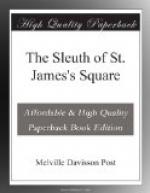He paused and pointed his long index finger through the doorway and across the hall.
“It was in my father’s room that I received him. It did not please me to put money into his hands. But I admonished him with wise counsel. He did not receive my words with a proper brotherly regard. He flared up in unmanageable anger. He damned me with reproaches, said I had stolen his inheritance, poisoned his father’s mind against him and slipped into the house and lands. `Pretentious and perfidious’ is what he called me. I was firm and gentle. But he grew violent and a thing happened.”
The man put up his hand and moved it along in the air above the table.
“There was a secretary beside the hearth in my father’s room. It was an old piece with drawers below and glass doors above. These doors had not been opened for many years, for there was nothing on the shelves behind them — one could see that — except some rows of the little wooden boxes that indigo used to be sold in at the country stores.”
The hunchback paused as though to get the details of his story precisely in relation.
“I sat at my father’s table in the middle of the room. My brother David was a great, tall man, like Saul. In his anger, as he gesticulated by the hearth, his elbow crashed through the glass door of this secretary; the indigo boxes fell, burst open on the floor, and a hidden store of my father’s money was revealed. The wooden boxes were full of gold pieces!”
He stopped and passed his fingers over his projecting chin.
“I was in fear, for I was alone in the house. Every negro was at a distant frolic. And I was justified in that fear. My brother leaped on me, struck me a stunning blow on the chest over the heart, gathered up the gold, took my horse and fled. At daybreak the negroes found me on the floor, unconscious. Then you came, Pendleton. The negroes had washed up the litter from the hearth where the indigo about the coins in the boxes had been shaken out.”
My father interrupted:
“The negroes said the floor had been scrubbed when they found you.”
“They were drunk,” continued the hunchback with no concern. “And, does one hold a drunken negro to his fact? But you saw for yourself the wooden boxes, round, three inches high, with tin lids, and of a diameter to hold a stack of golden eagles, and you saw the indigo still sticking about the sides of these boxes where the coins had lain.”
“I did,” replied my father. “I observed it carefully, for I thought the gold pieces might turn up sometime, and the blue indigo stain might be on them when they first appeared.”
Dillworth leaned far back in his chair, his legs tangled under him, his eyes on my father, in reflection. Finally he spoke.
“You are far-sighted,” he said.
“Or God is,” replied my father, and, stepping over to the table, he spun a gold piece on the polished surface of the mahogany board.




